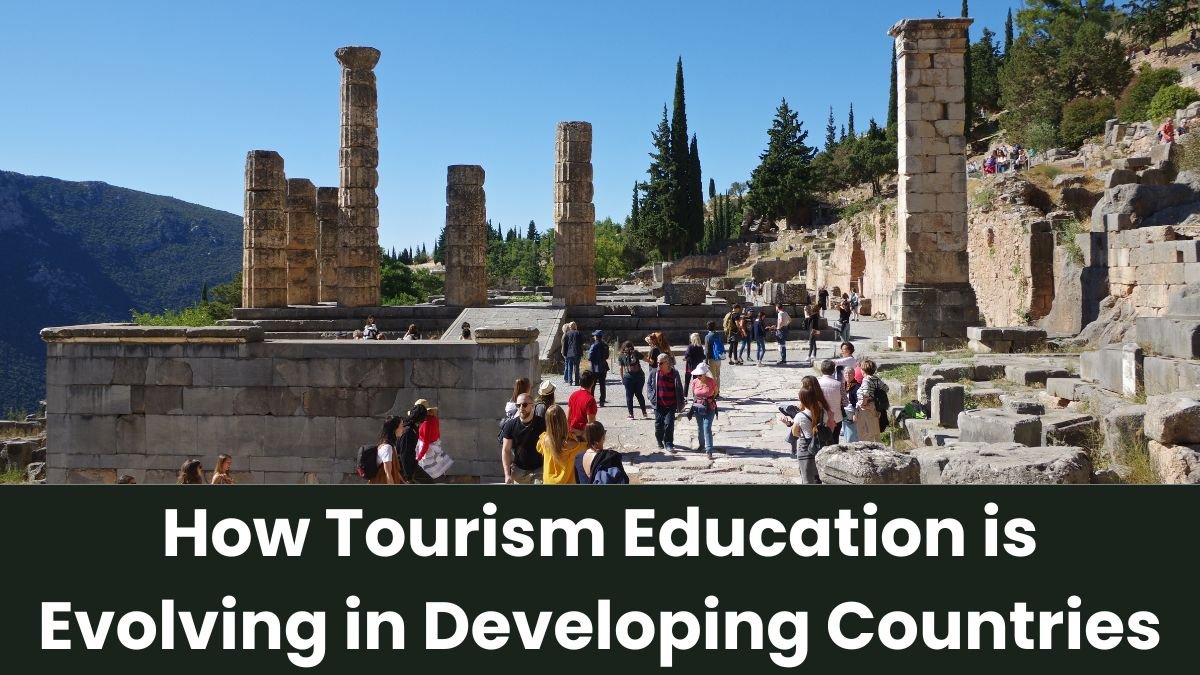Tourism: A Human-Centric Industry Tourism is not just about traveling or seeing new places, it is a vibrant medium of human relationships, cultural experiences and social bonding. When a person travels to a new country or region, he experiences not only the places but also the culture, customs, food and thinking of the people there. This is why tourism is also called the global heritage of humanity.
In today’s time, tourism is not only a means of entertainment, but it is also a major source of employment for millions of people. This sector has contributed $ 3.5 trillion to the global GDP in 2019 alone. But it is necessary to take a serious look at the education and training status of the people whose hard work is hidden behind this shining industry.
Current status of tourism education
The status of tourism education in developing countries is like a double challenge. On the one hand, millions of youth and women associated with tourism are employed, but on the other hand only 50% of them are able to develop practical or soft skills beyond the secondary level. Such as understanding instructions, communicating with others, or working in a team. All of these skills are important, but they alone are not enough in a competitive sector like tourism.
In fact, the tourism industry has become more technical, analytical, and strategic than ever before. In such a situation, it is becoming difficult for employees with only soft skills to advance in their career.
Need for hard skills
Hard skills are now mandatory for a successful career in tourism. These include:
- Database Management: Digital management of customer information
- Data Analysis: Understanding tourist trends
- Technical Knowledge: Hotel booking software, online tour platforms, etc.
- Computer skills: Use of Excel, Word, CRM tools, etc.
- Marketing and social media: Travel blogging, Instagram promotion, digital advertising
- Language knowledge: To communicate with international clients
- Design and copywriting: Creating travel packages, posters and promotional materials
If these skills are not developed, the youth working in tourism remain trapped in only temporary jobs, where they are never able to achieve stability and economic security.
Role of multilateral cooperation
In such a situation, the role of the United Nations World Tourism Organization (UNWTO) becomes important. This organization not only shapes tourism policies at the global level, but also works towards making tourism sustainable and inclusive through education and training in developing countries.
UNWTO has taken several initiatives:
- Online training modules: youth in remote areas can gain knowledge through digital platforms.
- Partnerships with local institutions: tie-ups with colleges, universities and private training centres
- Job and skill matching: linking qualified workers to the right opportunities
- These efforts not only reduce unemployment but also increase opportunities for decent work.
Special opportunities for women and youth
A large number of women and youth are employed in the tourism sector. It not only empowers them economically but also gives them social respect. But this is possible only if they get proper training and opportunities. For example, if a young woman from a rural area wants to become a tour guide, she will need language, history and communication skills – training for which is limited in the current education system.
Need for change in the education system
Instead of limiting tourism education to theory, it should include practical applications, internships, case studies, and modern technologies. Many colleges in developing countries are still using old methods in tourism courses, due to which students are not able to prepare for the job market.
Reforms required for this:
- Connecting industry-academia: Connecting institutions with hotels, travel agencies and guide organizations
- Training of digital tools: like Canva, SEO, Booking Engine, CRM Systems
- Focus on local heritage and culture: So that local youth can promote their region
- Special focus on language and communication skills
- Relation between sustainable tourism and education
Today when the world is struggling with environmental crises, over-tourism and exploitation of resources, it is very important to make tourism sustainable. Sustainable tourism not only protects the environment but also empowers local communities.
Tourism education should teach students how to:
- Respect local resources
- Minimize the use of plastic or waste
- Stay away from businesses that destroy culture
- Promote local products
- All this knowledge is possible only when these subjects are prominently included in the education system.
Conclusion:
Tourism education in developing countries is no longer just a means of obtaining certificates, but it has become a full-fledged professional skill field. If we want to make tourism a means of employment, inclusion and sustainable development, then we have to develop its education with the same perspective.
The role of UNWTO and other global institutions is commendable, but real change will come only when local governments, educational institutions and the private sector take concrete steps together in this direction.
